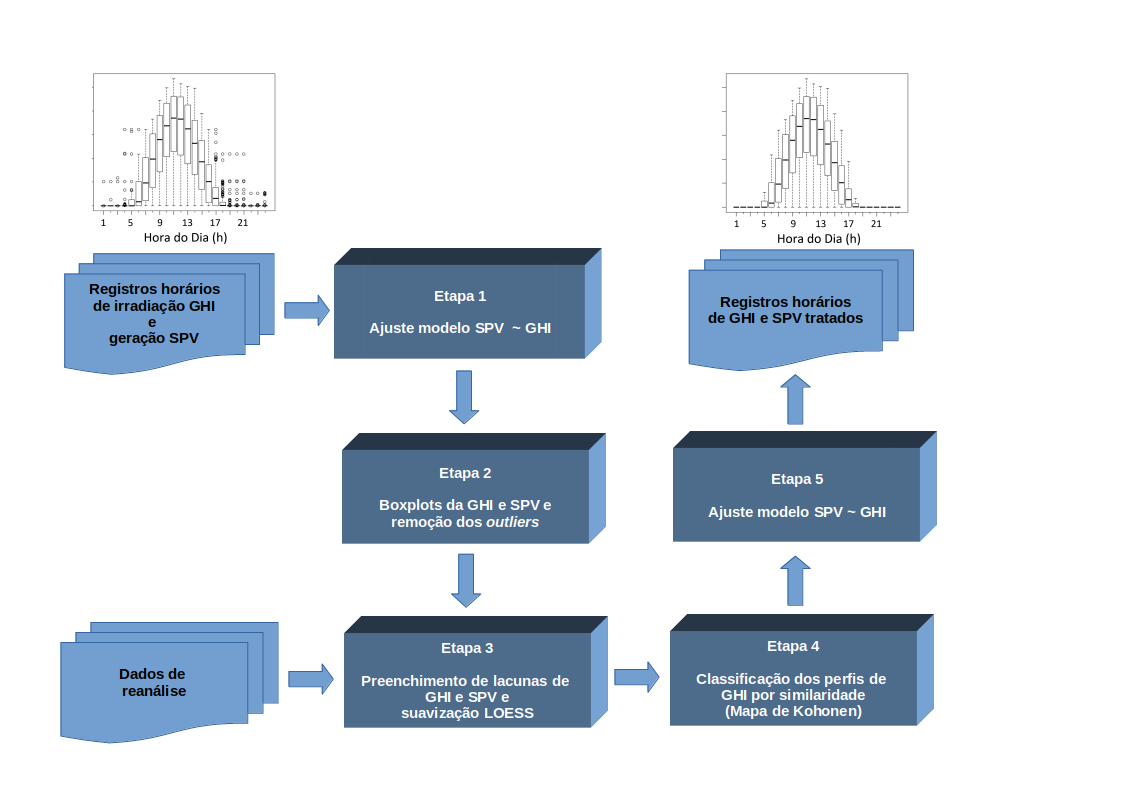An Approach for Data Treatment of Solar Photovoltaic Generation
Keywords:
data cleaning, self-organizing maps, Solar power generation, statistical analysis, time series analysisAbstract
A good solar power photovoltaic generation forecast depends on good quality time series data from measurements of Global Horizontal Irradiance and Solar Power Generation. However, measurement system failures and errors in data handling can corrupt data records with gaps and outliers that undermine forecasting accuracy. Therefore, it is important that the fitting of solar energy prediction models must be preceded by a data analysis in order to detect and correct measurement errors. Given that Global Horizontal Irradiance and Solar Power Generation are correlated variables, this paper aims to present the main characteristics of an offline approach developed for the joint treatment of hourly data values of both variables in a photovoltaic plant. In the proposed methodology, the measurements of Global Horizontal Irradiance and Solar Power Generation are analyzed by using reanalysis data and statistical and data mining techniques for the correction of outliers and the filling of data gaps. The application of the approach is illustrated by the analysis of measurements from a real solar PV system.
Downloads
References
International Energy Agency, World Energy Outlook 2018. [Online]. Available: www.iea.org.
D.M. Falcão, G.N. Taranto, C.C.O. Hincapie, "Chronological Simulation of the Interaction between Intermittent Generation and Distribution Network,". in 2013 IEEE PES Innovative Smart Grid Technologies LATIN AMERICA (ISGT LA 2013), São Paulo, 2013.
G.B. Rosas, E.M. Lourenço, D.M. Falcão, T.S. Fernandes, "Superação de Equipamentos, Reserva de Energia e Controle de Tensão em Sistemas com Forte Penetração de Energias Eólica e Solar," in XIV Symposium of Specialists in Operation Planning and Electrical Expansion, Recife, 2018.
J. Antonanzas, N. Osorio, R. Escobar, R. Urraca, F.J. Martinez-de-Pison, F. Antonanzas-Torres, "Review of photovoltaic power forecasting," Solar Energy, vol. 136, pp. 78–111, 2016.
M.G. De Giorgi, P.M. Congedo, M. Malvoni, D. Laforgia, "Error analysis of hybrid photovoltaic power forecasting models: A case study of mediterranean climate," Energy Conversion Management, vol. 100, pp. 117–130, 2015.
M. Malvoni, M.G. De Giorgi, P.M. Congedo, "Data on photovoltaic power forecasting models for Mediterranean climate," Data in Brief, vol. 7, no. May, pp 1639–1642, 2016.
J.F.M. Pessanha, T.C. Justino, M.E.P. Maceira, "Metodologia para filtragem de registros de carga," XII Symposium of Specialists in Operation Planning and Electrical Expansion, Rio de Janeiro, 2012.
J.F.M. Pessanha, V. Castellani, T.C. Justino, D.D.J. Penna, M.E.P. Maceira, "Uma metodologia para filtragem de medições anemométricas," Learning and Nonlinear Models, vol. 10, pp. 90-98, 2012.
R.A. Johnson, D.W. Wichern, "Applied Multivariate Analysis", 4th ed., New Jersey: Prentice Hall, 1998.
J.F.M. Pessanha, A.C.G. Melo, T.C. Justino, M.E.P. Maceira, "Combining Statistical Clustering techniques and Exploratory Data Analysis to Compute Typical Daily Load Profiles - Application to the Expansion and Operational Planning in Brazil," in Probabilistic Methods Applied to Power Systems (PMAPS), Boise, 2018.
J.F.M. Pessanha, R.M. Velasquez, A.C.G. Melo, R.P. Caldas, "Técnicas de Cluster Analysis na Construção de Tipologias de Curva de Carga," in XV Seminário Nacional de Distribuição de Energia Elétrica, Salvador, 2002.
S.C. William, "Robust locally weighted regression and smoothing scatterplots," Journal of the American Statistical Association, 74.368, PP. 829-836, 1979.
T. Kohonen, "Self-Organization and Associative Memory," Springer Berlin Heidelberg, vol. 8., 1989.
S. Haykin, "Redes Neurais: princípios e prática", Porto Alegre, Bookman, 2001.
A.C.P.L.F. Carvalho, A.P. Braga, T.B. Ludermir, "Fundamentos de Redes Neurais Artificiais", in 11a Escola de Computação, Rio de Janeiro, 1998.
S. Pfenninger, I. Staffell, "Long-term patterns of European PV output using 30 years of validated hourly reanalysis and satellite data,” Energy - Elsevier, vol. 114, pp. 1251–1265, 2016.
W.S. Parker, "Reanalysis and observations: what´s the difference?," in Bulletin of the American Meteorological Society, vol. 97, no. 9, 2016.
S. Pfenninger, I. Staffell, "Simulations Of Hourly Power Output From Wind And Solar PV Farms." [Online]. Available: https://www.renewables.ninja/.
M. V. Contes Calça, M. R. Raniero, D. M. Zeca Fernando, S. A. Rodrigues and A. Dal Pai, "Outliers Detection in a Quality Control Procedure for Measurements of Solar Radiation," in IEEE Latin America Transactions, vol. 17, no. 11, pp. 1815-1822, November 2019.
R. M. Salgado, T. C. Machado and T. Ohishi, "Intelligent Models to Identification and Treatment of Outliers in Electrical Load Data," in IEEE Latin America Transactions, vol. 14, no. 10, pp. 4279-4286, Oct. 2016.
R Core Team (2018). R: A language and environment for statistical computing. [Online]. Available: https://www.R-project.org/.
R. Kimura, " Numerical weather prediction," in Journal of Wind Engineering and Industrial Aerodynamics, vol. 90, no. 12–15, pp. 1403-1414, December 2002.


